The following interview was originally published in the latest issue ( Volume 3 Number 4 & 5) of Torture: Asian and Global Perspectives
ON 25th September 2014, Basil Fernando and the Asian Human Rights Commission was bestowed with the coveted Right Livelihood Award, widely known as the “Alternate Nobel Prize,” for “his tireless and outstanding work to support and document the implementation of human rights in Asia.”
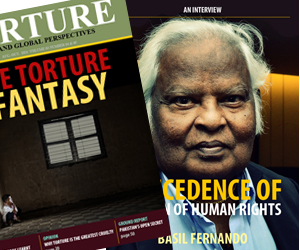 The Right Livelihood Award was established in 1980 and honours those “offering practical and exemplary answers to the most urgent challenges facing us today.” The Right Livelihood Award has no categories, the award recognizes that, in striving to meet the human challenges of today’s world, the most inspiring and remarkable work often defies any standard classification.
The Right Livelihood Award was established in 1980 and honours those “offering practical and exemplary answers to the most urgent challenges facing us today.” The Right Livelihood Award has no categories, the award recognizes that, in striving to meet the human challenges of today’s world, the most inspiring and remarkable work often defies any standard classification.
The others who were also awarded the prize were; Asma Jahangir, for protecting human rights in Pakistan and globally; Bill McKibben and the 350.org, for mobilising a global movement against climate change; a joint honorary award to Edward Snowden and Alan Rusbridger, for courage in revealing the extent of illegal government mass surveillance and for establishing a standard for responsible public interest journalism, respectively.
Torture Magazine caught up with Mr. Fernando in his office, minutes following the announcement of the award to speak with him of his lifetime of achievements that won him and the AHRC global acclaim of the “Alternate Nobel Prize.”
Torture Magazine (TM): Mr. Fernando, congratulations on this momentous achievement. Thank you for taking the time from your busy schedule to speak to us, on a subject that is perhaps the closest to your heart, the work, times and, more importantly, the ideology behind the Asian Human Rights Commission and its sister organization the Asian Legal Resource Centre. The Asian Human Rights Commission, as we are aware, began operations in 1984 and you were one of its founding members. Would you tell us briefly the story of its beginnings and its journey during the past three decades?
Basil Fernando (BF): Thank you. When one speaks of human rights organizations and their histories we should always bear in mind that what we really refer to are the problems of societies, the problems of the people living in the societies. Taken in this perspective, whether we speak of the last 30 years or the coming 30 years, one would see, certain important issues that are common in all the Asian countries.
That being said, each country has its unique set of problems particularly, in relation to the type of evolutions that has taken place over time of the different political institutions and the public justice systems. They have a direct bearing on the distinct types of human rights problems that people face as a result.
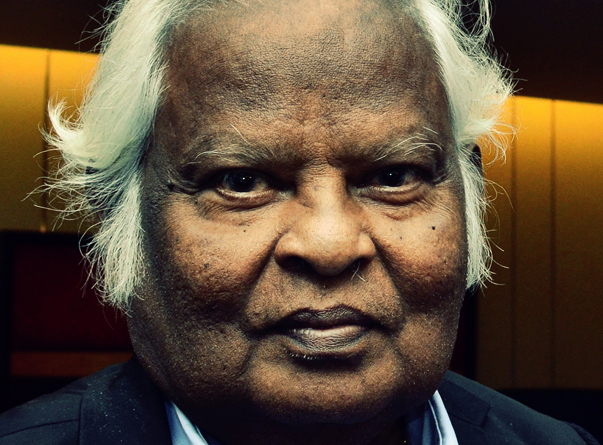
Basil Fernando, Photo © TORTURE: Asian and Global Perspectives
Let us then first look into the past 30 years. As you know, 30 years is quite a long period of time in the life of an individual, and what all these individuals in Asia experienced during the past years of their lives is of grave significance. On the other hand, it can also be said that 30 years, taken in a historical sense, is only a short period of time. Certain events may have taken place during that particular 30 year period, and such events may have been connected to events which took place during earlier periods and likewise all these events may have links dating as far back as several centuries and therefore, such series of events may be connected to what took place within the last 50 years of our history and would similarly manifest themselves in the next 50 years to come. Both these factors are important when considering every small moment in the lives of individual citizens. Added to this, when speak of the many problems of human rights we must also equally consider the larger picture of the history of each country.
In this light, Asian countries in the last 30 years witnessed the surfacing of an enormous amount of tension; tension, from struggles for democracy; tensions from struggles for the expansion of freedoms of people; tensions from experiencing severe forms of authoritarian systems; and tensions from such systems’ practices of various forms of repression.
I will try to elaborate on some aspects of the struggles for the expansion of freedoms in Asian countries in general;
Firstly, from the point of view of education of the masses or whom we refer to as ‘ordinary folk’ there have been vast levels of changes in many of the countries in Asia. The degree of this change varies from country to country. However, to say that ‘education in the Asian Continent has undergone a colossal change’ is an accurate statement. This colossal change has a substantial impact on the development of the discourse on human rights.
It is education that contributed to the possibility of development of social movements within Asia. 19th Century literature makes references to the ‘common folk’ as being mere ‘passive peasants’. In example, a leading figure in modern Chinese literature Lu Xun very strongly critiqued people’s passiveness and their archaic habits which have been a part of the Chinese culture. A predominant theme of Lu Xun’s writing is an exhortation to the people, calling on them to ‘modernize their minds’. What Xun meant by ‘modernizing their minds’ was to learn of the changes; to learn the changes that were taking place not only in China, but in the world, particularly in the west. Similar critiques can also be traced in many other countries in Asia. In India, writers and social reformers worked steadfastly against oppressive and discriminative practices such as the caste systems and other social discriminatory customs particularly, relating to the way women were treated in societies and urged for radical reforms. These are all common features in Asia.
“
Brutal and barbaric policing therefore is a serious problem in the society. It is a prescription for insecurity, violence, and every form of cruelty that can take place within a society.
“
These times also witnessed in all Asian countries, even amongst the poorest strata of society, an opening of opportunities for children to obtain a formal education and in certain countries opportunities were extended to more extensive education for some.
Besides these changes, there was at the time, the development of another form of education across Asia. It was introduced by way of modern media, the radio to begin with, later by television broadcasts, print media such as newspapers, and today through the electronic media. This trend in providing access to information was one of the major factors that gave rise to change.
Similarly, political and social movements too were constantly evolving. In some countries, for example in China, revolutionary movements virtually changed the entire character of the nation. These revolutions although – they may have brought their own forms of repressions – directed the change from how these societies were functioning in the past. These movements revolted against the subjugation of the ordinary people and made them considerably change into more powerful persons or groups.
In addition to all this, the period also witnessed vast changes in infrastructure within each country; with the improvement of roads, railways and eventually air-transport. Today, large numbers of persons, even those from very poor backgrounds, make use of all these facilities including air transport, to migrate to foreign countries, particularly for employment. Understanding all these aspects in such transformations – is of utmost importance in trying to understand the problems of human rights of the people of Asia.
The very fact that the overall ethos of Asia is one in which people themselves are engaged in changing their ways of life and through a very natural process – is the single most basic condition that creates massive opportunities for change in the field of human rights.
This positive factor should always be taken into consideration at all times, when we speak about the very serious human rights issues that still persist in Asia, which often frustrates any person who wishes to engage in the promotion of human rights and for change. While the negative factors weigh overwhelmingly, in almost all the countries in Asia, what should be commended upon and what all human rights organisations and other activists should pay the greatest heed to is the positive factor that even today Asian societies through a natural process and by themselves alone are engaged in attempts to change.
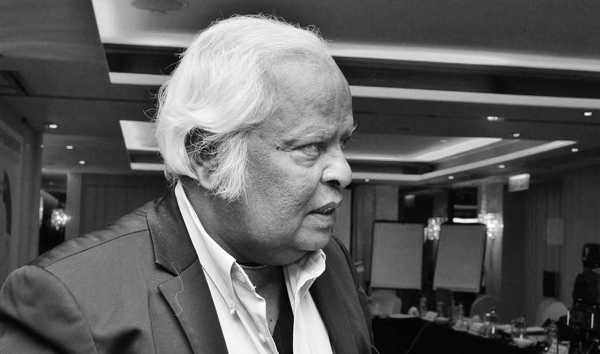
Basil Fernando, Photo © TORTURE: Asian and Global Perspectives
TM: We understand that it has been indeed a long journey that both these organizations have travelled far from those humble beginnings. Today, AHRC is a household name in the international civil society and its stance against violations of human rights abuses is often in the limelight in many of the 13 Asian countries you work in. This work is if often referenced and quoted in publications and other media. Your sister organization, the ALRC, enjoys UN’s ECOSOC general consultative status and particularly the work on Torture is well known. Torture is a subject that most civil society organizations refuse to touch upon. Why did the AHRC specifically choose to work predominantly on the prevention of torture? What made you tread where others dared to tread?
BF: Torture reveals the inner structure of a particular society. If the police are able to investigate into crimes and to independently carry out their role in the process of facilitating prosecutions, it means that such a society has sound infrastructural facilities to protect its people. If the police and other security agencies need to use force in administering the process of criminal justice, it then is a clear indication that such a society does not possess a strong legal infrastructure for the protection of its people.
The most essential function of a state is the protection of its people. Protecting the people is what we term as ‘people’s security’. All of us want security. Parents who are in charge of the most important unit in the society—‘the family’— are deeply concerned in the security of their children, in the security of their properties, and in the security to move freely in their day to day lives. These are the issues that pre-occupy the minds of parents. In particular, parents of the girl child are even more concerned with security because the girl child needs also the protection from sexual abuse.
We can also say that those who are engaged in any type of business too want security; they require security of their contracts. All transactions take place in terms of contracts, whether they are of a formal or an informal nature. People need to feel that the obligations under such contracts would be carried out or in the least there exists a predictable legal process through which they are able to ensure their rights.
Those who are engaged in political life also seek security. For example, ensuring free and fair elections require considerable amounts of arrangements for security. If such a security does not exist, more powerful and financially affluent parties will use various other means to ensure that they win the elections irrespective of whether they receive votes or not. For a political life to be a safe one, there needs to be established the understanding that in all political affairs there should be certain basic rules maintained and that such rules are being observed.
In ensuring these modes of security, the police and the security forces play a key role. If the police and the security forces cannot perform their duties without the use of torture and ill-treatment then it means the police and the security forces are ill-equipped. They are ill-equipped from the point of view of competence; ill-equipped from the point of view of abilities to do their jobs and ill-equipped with resources such as transport, communication and forensic knowledge all of which are somehow not adequately available to them. Thereby, if they are not competent and if they do not possess the requirements to carry out their jobs then they are incapable of performing their primary duty of protecting the people.
Brutal and barbaric policing therefore is a serious problem in the society. It is a prescription for insecurity, violence, and every form of cruelty that can take place within a society. If the police and the security forces in a country are the likes of such, then it is a dangerous place to live in. That is the primary reason to have always been concerned with and to study and to observe whether the policing systems in each of the countries we work in are sound ones and are ones that can perform their functions with utmost rationality and discipline.
Moreover, we have been focusing on the issue of torture for the reason that when a person is tortured or ill-treated, the basic principle of inviolability of the human body is violated. No government has the right to violate the physical security of a person. It is a fundamental law among nations, and a fundamental principle of civilization that the inviolability of the human body should be respected. If the police and the security forces are using torture and ill-treatment, it means they are violating one of the most basic rules of human civilization.
TM: Your work and the work of the AHRC as well as the ALRC is nearing 30 years this year. What, in your view, have been its most important achievements?
BF: We have witnessed in all the Asian countries, amongst the ‘ordinary folk’, amongst men and women, a new consciousness, and a new intelligence. People want change. They demand change. People demand that their human rights are respected by their governments, not
through mere words but by genuine improvement of the public institutions; they demand justice to be something real, tangible and accessible. Repression, by whatever means, such as enforced disappearances, extra-judicial killings, torture, suppression of freedom of expression, cannot succeed in any way in destroying this renewed consciousness, this new intelligence.
The wisest way to deal with these demands is for governments to facilitate these changes that are demanded of them. It is the only way open to end violence and achieve peace in all parts of the world. More developed countries should demonstrate more wisdom by assisting such changes and not in supporting repression.
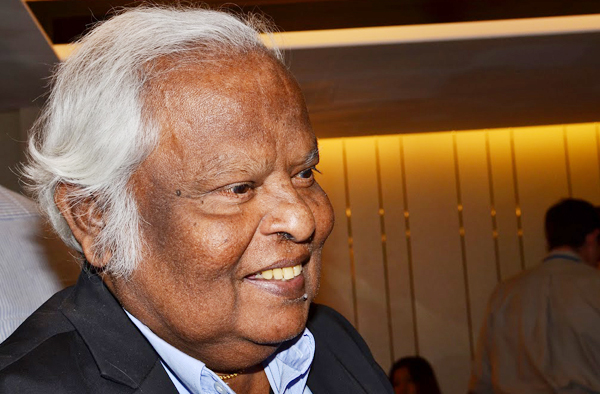
Basil Fernando, Photo © TORTURE: Asian and Global Perspectives
TM: Let us digress for a moment and reflect upon some questions of a more personal nature. You began your career as a lawyer. You are a poet, a writer and a jurist. What in your life and experiences inspired you to work towards the protection of human rights in Asia? We were also told that not only are you an acclaimed poet but also an ardent artist and that you have a collection of your drawings to show. Tell us a bit more about you as a poet and how that has influenced your work orvice-versa. What has mostly influenced your poetry and your drawings? Is there any particular reason you like to draw birds?
BF: I have been writing poetry since my student days. In fact, one of my youthful aspirations was to be a poet. However, over the years my ideas on poetry too, have changed.
Some of my early poems were written in English. I think there may have been around 200 such poems. Some of these poems have been translated into Sinhalese by Radhika Gunawardana and a collection was published last year. These days, I am writing in Sinhalese again and yet another collection of my poems has been published this year. I have also done some translations of poetry of other well-known poets, and a thin-volume of such poetry has been also recently published.
I have not consciously selected any particular theme for poetry and most of my writings have emerged as a response to the various types of events which have taken place in actual life and also as a response to some of the things that have pre-occupied my thinking.
Looking back at these poems today, I can see some commonalities. One theme that –often re-emerges is the issue of human suffering. It is in the human suffering that we see the deep links between the personal-self and the collective; in other words of me vs. the others. The times we live in, are times of intense human suffering both from a global sense and also from an inner more personal sense in terms of my country, Sri Lanka.
From a global sense, the last century has been, to a great extent, a period of disappointment for all humanity. This does not refer to only the two world wars, the civil and cold wars, but to the alarming calamities that took place in almost all the countries, in some more so than others.
Primarily, this disappointment is about the feeling that almost all human ideals have been betrayed. Take for example, the enthusiasm that many people understood and expressed in socialism at the time. It was perceived as a possibility of obtaining equality, brotherhood and justice. That enthusiasm ended in disappointment. To people’s sheer shock they realized, as the years went by, of the kind of ‘horror’ that socialism unleashed on the people. The carelessness with which many millions of people were shot dead or otherwise killed during that time, is today being revealed with greater detail. The creation of fear through killings led to the creation of labour camps or gulags, which depicts a situation worse than slavery. The amount of anguish that was caused as people ultimately discovered what socialism really came to be is one of the major causes of disappointment in our times.
On the other hand, people’s ideals and beliefs of the ‘free world’, have also been thoroughly proved wrong and have disappointed almost all of us. Despite the massive improvements in technology and production, most people living in these countries do not derive the benefits of such progress. Instead, there have been reports of malnutrition even in the United States and Western Europe. Many have died without basic healthcare, all these can be easily provided if policy makers and the leaders could agree to resolve these problems. However, they cannot seem to agree, because there is heavy pressure from a very thin minority of people who own most of the world’s resources. The result of which is, that these pressures are being more forcibly brought to bear on the people due to the influence of modern mass media and communication facilities.
Technological progress in communication facilities has been used to feed humanity with more lies than ever before. The ugliest forms of lies have been deliberately published and re-published with the view to manipulate the human mind. Manipulation has become the aim whereas the ideas of revealing the truth have become increasingly obscure and more difficult a task.
Those who know the truth are treated as dangerous elements in our societies. Many have been killed or subjected to other forms of suffering, merely because they spoke the truth and had knowledge of facts and events that have been guarded as grave-secrets.
One of the greatest causes of human suffering is the loss of trust amongst human beings. People distrust their own leaders because they know, that once in power, these leaders cannot and do not speak the truth. One day, people elect a leader with great enthusiasm and shortly afterwards they begin to hate him as never before and consider him nothing but a liar.
The price for all this is paid by the ordinary people who are now exposed to problems such as enforced disappearances, extrajudicial killings, incredible forms of torture, ill-treatment, starvation, malnutrition, manifold forms of slave-like practices, most cruel forms of barbaric treatment of women under the pretext of culture, religion and traditions, and the like. Most of these people have no way out of any of these problems.
Perhaps, the greatest forms of suffering stem from the absence of truly effective justice systems. Particularly in the developing countries almost as a ‘rule-of-thumb’, there is the denial of the possibility of creating and maintaining public justice institutions. The police force, in most countries acts as predators rather than as protectors of the people. The same is true of even of judges, prosecutors and the lawyers, all of whom have become a menace to mankind instead of being their guardians.
As Albert Einstein said, ‘technological progress is like an axe in the hands of a pathological criminal’. More human energy is spent on creating weapons of mass destruction and we all live in fear of what has thus been created.
There is more separation, than genuine love and friendship. This list can go on, endlessly. However, the fact remains that human beings, commonly, experienced suffering and not true happiness.
In the midst of such human suffering, humanity is still in search of truth, love, solidarity and compassion. There is this contradiction in the sufferer who in his deep suffering yearns for such things as love, compassion, friendship, and more deeper meaning to life than mere material goods—the human being yearns for that wonder of the ‘undefeated human spirit’.
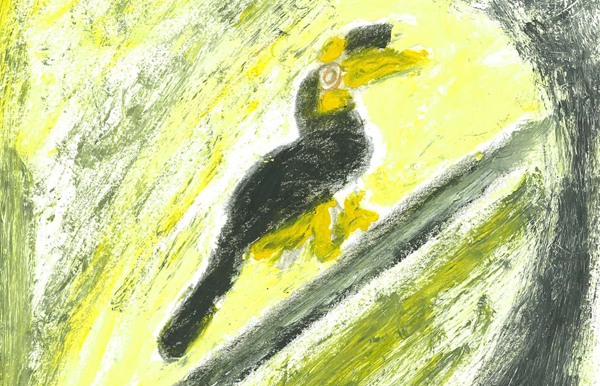
Painting by Basil Fernando
These are some of the ideologies that my poetry ‘has come to deal with’. I say, ‘have come to deal with’ particularly because I did not consciously try to bring these themes into my poems but these musings of the suffering of humanity have entered into my poetry from a stream of thought that eternally flows inside us. Yes, there is such a stream inside all of us. It is out of that stream that these expressions have emerged by way of poems which I have written over the years and published.
Some of these poems have taken me by surprise. For example;” the much reproduced poem “Yet another incident in July 1983” written in 1983. Each year I have found more meaning in this poem. In other words, my poem speaks back to me. There are many such poems which I have written on the spur of the moment but as time passes by, I have found some of my deepest inner thoughts that have emerged through such poems even before I was myself conscious of such thoughts.
Regarding the very few amateur drawings [smiles] I have done, of which I am aware of, yes, birds have been the main object of my drawings. Of course, everyone loves birds. That kind of love that we all have for these ancient creatures is something that comes naturally to all of us. I am not able to explain why. However, birds are for me many things. They represent our aspiration of wanting to fly; of our aspirations to be free. This is why no amount of suffering can pin the human spirit down. We all want to fly away to another place, another time. We often do not know what that other place might be, but we simply do not want to be imprisoned or caged. To me, birds are also the symbols of beauty.
I then photographed beauty
Who are you?
I asked a bird that was
Posing for a photograph.
I am beauty,
The bird told me.
Are you from heaven
Or earth?
I asked the bird.
I have wings and feet,
I eat and sing,
The bird told me.
Are you an angel?
I asked.
No, the angels
Were modeled after me,
The bird replied.
I then photographed
Beauty
– Basil Fernando
We also know that birds can be our protectors. When certain types of insects, such as locusts for example, that breed in numbers (millions) and swarm together to destroy our environment, it is the birds that protect us, that protect the crops by feasting on the “would be destroyers” of the crops. For example, we are aware of such a destruction taking place in China, during The Great Leap, which ended in a catastrophe, when they killed in large scale the sparrows and as a result of the killing of all the sparrows, who were natural predators of locusts, the problem was aggravated by the devastating locust swarm, which killed all the crops and made the fertile ground unfertile to grow any crops in again. The ecological balance that was lost by killing the birds, who are natural predators of insects, had to be restored for plant life to be protected. So much can be said about birds because I believe we ourselves would like to be birds, if that is ever possible.
Read more about Basil Fernando at basilfernando.org